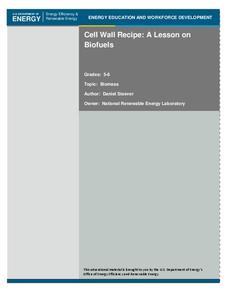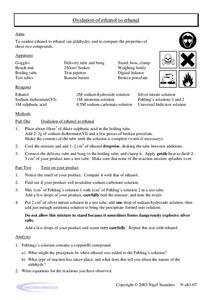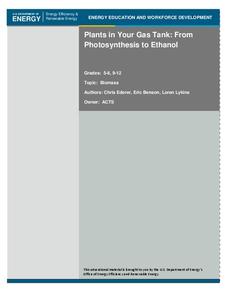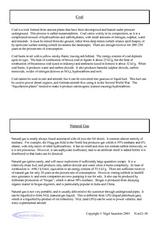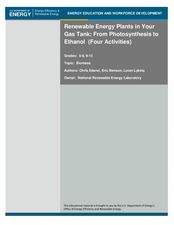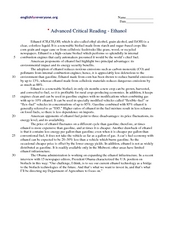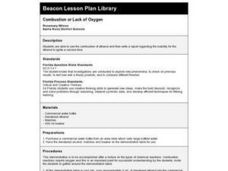Curated OER
Cell Wall Recipe: A Lesson on Biofuels
Biotech engineers discover that changes in the DNA code for cell wall formation can help create crops better suited for biofuel production. They extract DNA from wheat germ. They decode paper strips with codes and relate the activity to...
Curated OER
Ethanol Fermentation
Biofuel is a possible form of clean and renewable energy. Engineering explorers observe the fermentation process, and then alter the temperature to discover the effect on fermentation. The plan is complete with materials, procedures, and...
Royal Society of Chemistry
Alcohols (14-16)
Ethanol, a grain alcohol, reduces emissions and conserves petroleum when mixed into gasoline. Four puzzles challenge pupils to match alcohols to their structural formulas, types of alcohol, and full oxidation products. Each puzzle...
Royal Society of Chemistry
Investigating Temperature Changes on Evaporating Liquids—Microscale Chemistry
Is there more to evaporation than just less liquid? Show young scientists the energy transformation that occurs during a phase change through a series of simple experiments. Lab partners place drops of water, ethanol, and ethoxyethane on...
Concord Consortium
Mixing Liquids
Sometimes being mixed up is a good thing! Young chemists explore the basics of making solutions with a realistic interactive. Pupils observe the differences in volume using quantities of water and ethanol, as well as the effects of...
Creative Chemistry
Oxidation of Ethanol to Ethanal
Here is a laboratory exercise in which chemistry masters conduct an oxidation reaction to change ethanol into ethanal. They compare the original alcohol to the resulting aldehyde by forming a precipitate. This activity is aimed at...
Curated OER
Plants in Your Gas Tank: From Photosynthesis to Ethanol
Explore ethanol and how it is produced. Young scientists investigate photosynthesis and fermentation to the concept of conservation of energy and mass. They discuss the environmental and economical benefits of ethanol as a fuel additive.
Curated OER
Gasoline Additive
Chemists consider a situation in which an ethanol producer needs to determine how much to add to t-butanol to prevent freezing during transport. They work in the laboratory to obtain the freezing point depression constant for the...
Creative Chemistry
Fuels - The Good, the Bad, and the Ugly
Science pupils choose from twelve questions about five different types of fuel: hydrogen, ethanol, crude oil, natural gas, and coal. They construct a table to compare them and then determine the best fuel. Your physical science class...
Curated OER
# 18 Gas Chromatography: Introduction and Application
Young scholars are introduced to a gas chromatography using a discovery-based approach. They are presented with a scenario/industrial application where their job is to verify that the company's mouthwash contains a specific percentage of...
Curated OER
Filling Up-Gasoline
In this fuel sources worksheet, students calculate the E85 alternative fuel costs per gallon compared to the cost of gasoline. Students complete a table to show the comparison prices. They create a triple line graph to show the...
Creative Chemistry
Oxidation of Ethanol to Ethanoic Acid
Students covert ethanol to ethanoic acid using a condenser for this oxidation reaction worksheet. They test the smell of the final product, add sodium carbonate, and test the product with indicator paper. They explain their observations...
Curated OER
Biomass: The Energy of the Future
Sixth graders examine information about a variety of renewable fuels. They read key vocabulary terms, read and discuss a story handout, and conduct research on renewable fuels. Students then complete a comparison chart, and write an...
Curated OER
Not Just a Corny Idea
Learners explore ways in which ethanol can be created using alternate energy sources.
Curated OER
Renewable Energy Plants in Your Gas Tank: From Photosynthesis to Ethanol
Learners examine the role photosynthesis plays in plant survival. In this renewable energy lesson students document their observations and analyze and interpret their results.
Curated OER
Photosynthesis and Biomass Growth
Sixth graders examine renewable energy sources such as ethanol. In this photosynthesis and biomes lesson students complete a project on farming techniques.
Curated OER
Kernel Power" Ethanol Fuel from Corn
Students study why corn is a biodegradable, renewable resource. In this ethanol lesson students build models and observe a chemical reaction.
Curated OER
A Pre-Treatment Model for Ethanol Production Using a Colorimetric Analysis of Starch Solutions
Students recognize the benefits of ethanol and study photosynthesis. In this ethanol lesson plan students complete an experiment that shows the procedure that starch can be hydrolyzed by salivary amylase.
Curated OER
Reaction Rates and Catalysis in Ethanol Production
Students investigate alternative catalysts for the degradation of hydrogen peroxide. In this fermentation instructional activity students complete an activity that breaks down cellulose into sugar.
Curated OER
Advanced Critical Reading: Ethanol
In this advanced critical reading learning exercise, students read a passage about ethanol then answer questions. Students make inferences, determine author's purpose and use context clues to find the meaning of unknown words in the...
Curated OER
Ethyl Alcohol
In this ethyl alcohol worksheet, students read about the characteristics of ethanol including the effects it has on the body when ingested and digested. This worksheet has 2 short answer questions.
Curated OER
Science Trail
Pupils take a trip on a science trail to explore how corn and soybeans can be made into fuel. They make a list of byproducts that come from soybeans. Afterward, they participate in the activities related to the creation of ethanol such...
Curated OER
The Price is Right?
Twelfth graders read "A Primer on Gasoline Prices" and complete a worksheet on the price of gas. They discuss supply and demand and what a consumer can do about prices at the pump.
Curated OER
Combustion or Lack of Oxygen
Fourth graders experiment and see the combustion of ethanol, then write a report about why ethanol didn't ignite a second time.


